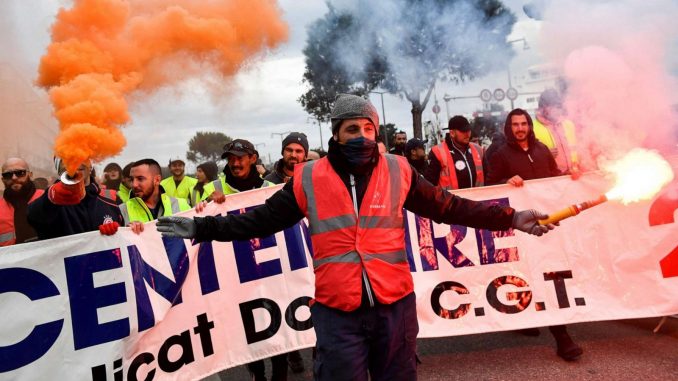
On February 29, the French government used an executive order to pass a widely-hated reform of the pension system, which is their equivalent of social security. The government of President Macron had attempted to sell this reform as one leading to “more equality,” eliminating the so-called “privileges” that workers in the public sector have won through their fights. In reality, this complex reform will lead to lower pensions for all workers, in the public as well as in the private sector, and workers haven’t fallen for the “equalizing” propaganda. After years of attacks against their standard of living, they are fighting back.
The executive order, essentially shutting down debate in the National Assembly, provoked outrage. As of this writing, working people and students are demonstrating and attending meetings, with more strikes expected to oppose the reform.
The fight began in September of 2019, with a series of impressive strikes and demonstrations to force the government to withdraw the reform completely. The strike movement was begun by the transportation workers. Railway workers were followed immediately by the bus and metro workers, especially concentrated in Paris. A general strike of the public sector on December 5, 2019 had massive participation, with some organizing daily gatherings to vote on whether to continue their strike. Their banners read: “We Won’t Let up until Complete Withdrawal,” and “Macron, Out!”
Remarkably, this movement has engaged workers across professions, uniting employees of the train company, buses and subways, hospitals, the electric company, some nuclear power plants, refineries, and sanitation along with ballet dancers, opera singers, lawyers, teachers, students, and the list goes on. This is a departure from an old pattern of fighting separately for individual gains in each industry. There is a developing understanding that the fight is one of all employees against the whole world of the rich: politicians, bankers, CEOs and their friends.
During the winter break, when the union leadership failed to organize, rank-and-file workers stepped up. In many cities unionized and non-unionized workers together elected their own strike committees which met daily to plan their actions and do public outreach. In some areas there were weekly general assemblies of workers in addition to daily strike committee meetings. There were also wonderfully creative gatherings, such as on December 24, when the ballet dancers of the Paris Opera performed Swan Lake in front of the Garnier Palace, for the public to enjoy for free, under banners reading: “Culture in Danger,” and “Opera on Strike.”
The fight against this reform is continuing. Whatever happens, one result of this movement will be that thousands of workers have gone through the extraordinary experience of leading their own struggle with some very long strikes, and solidarity across professions. They are coming to see themselves as a class, discovering the compromising behavior of untrustworthy union leaderships, and confronting the police who defend the policies and the property of the rich. They’ve had a priceless experience, and are looking for a new way forward.

